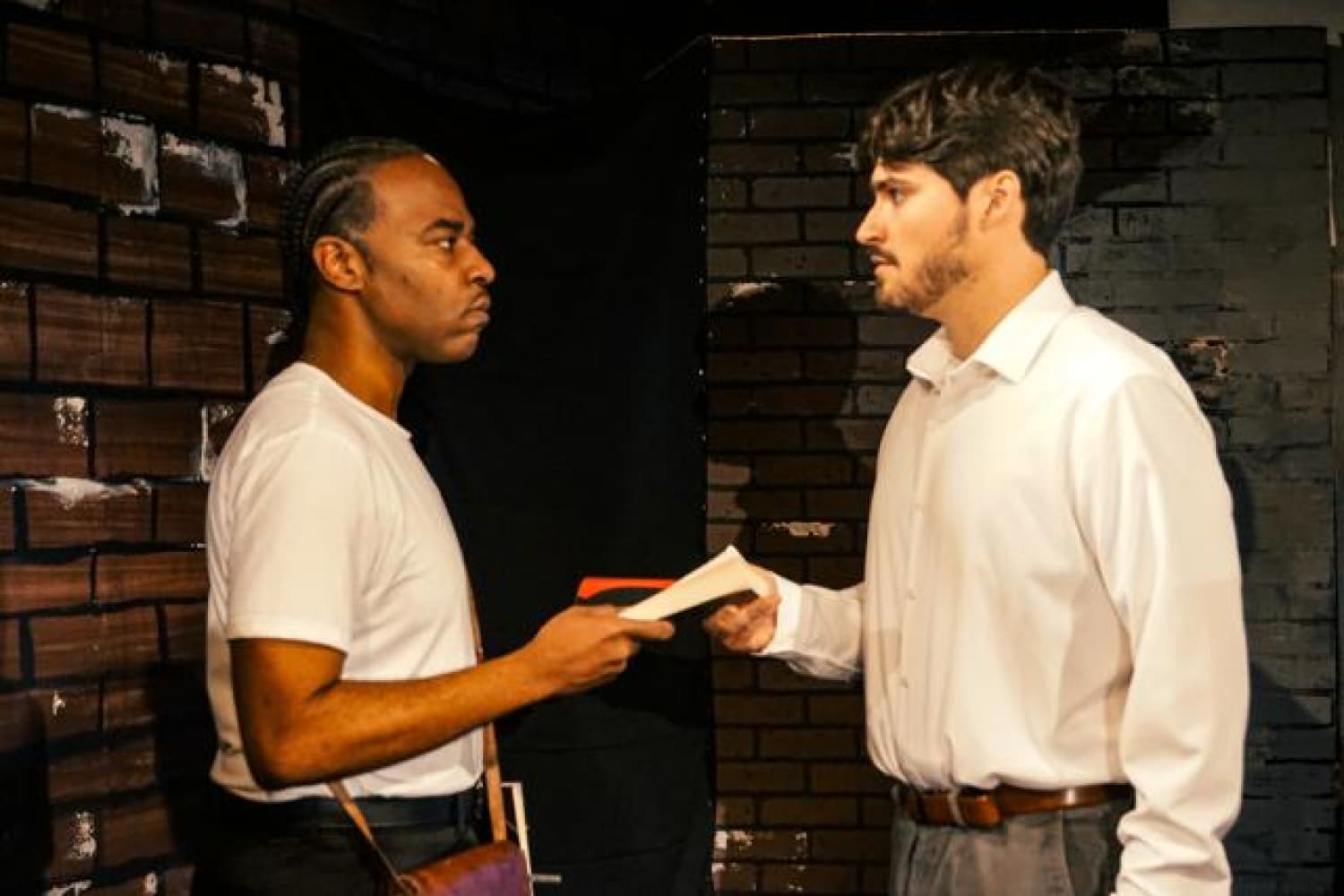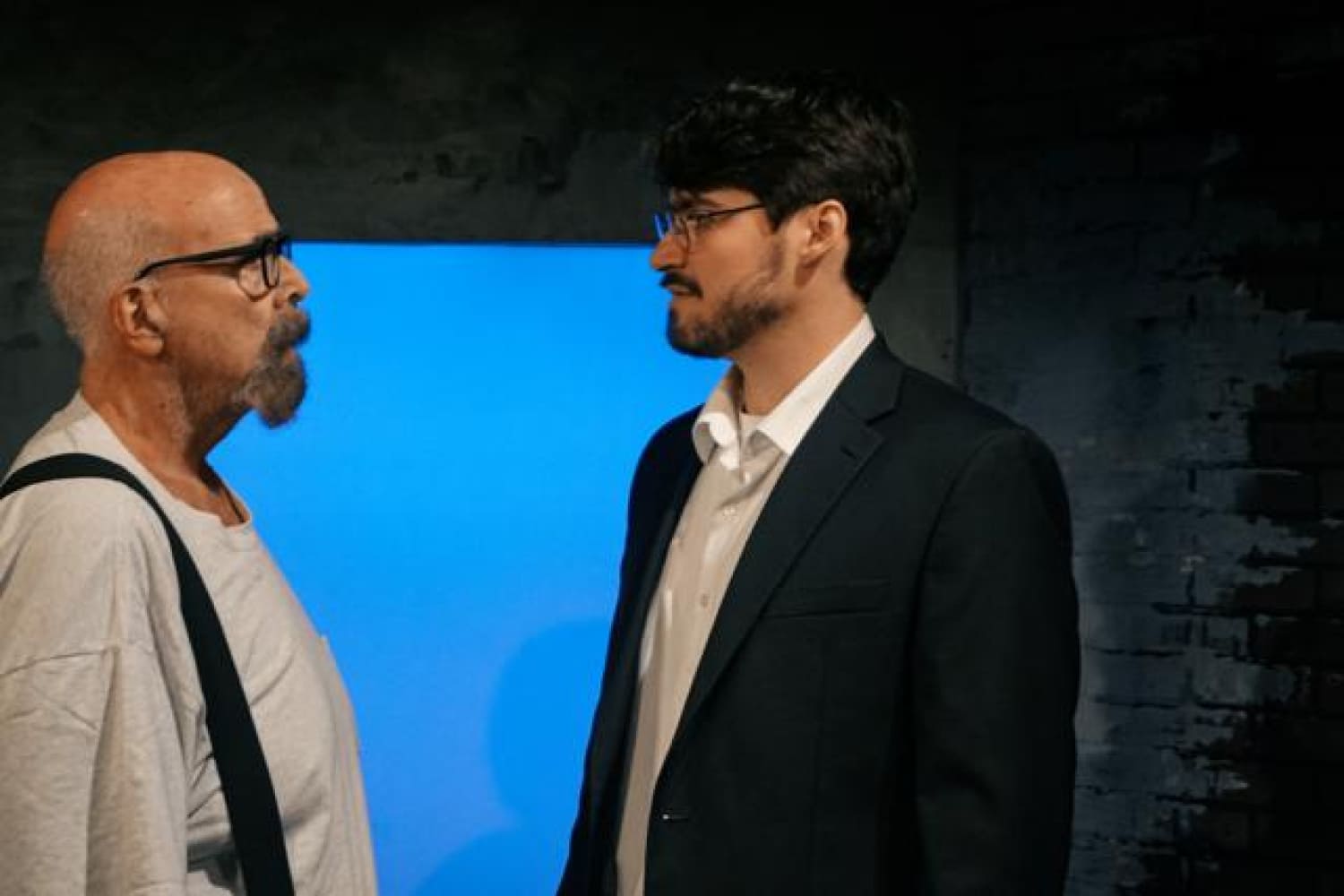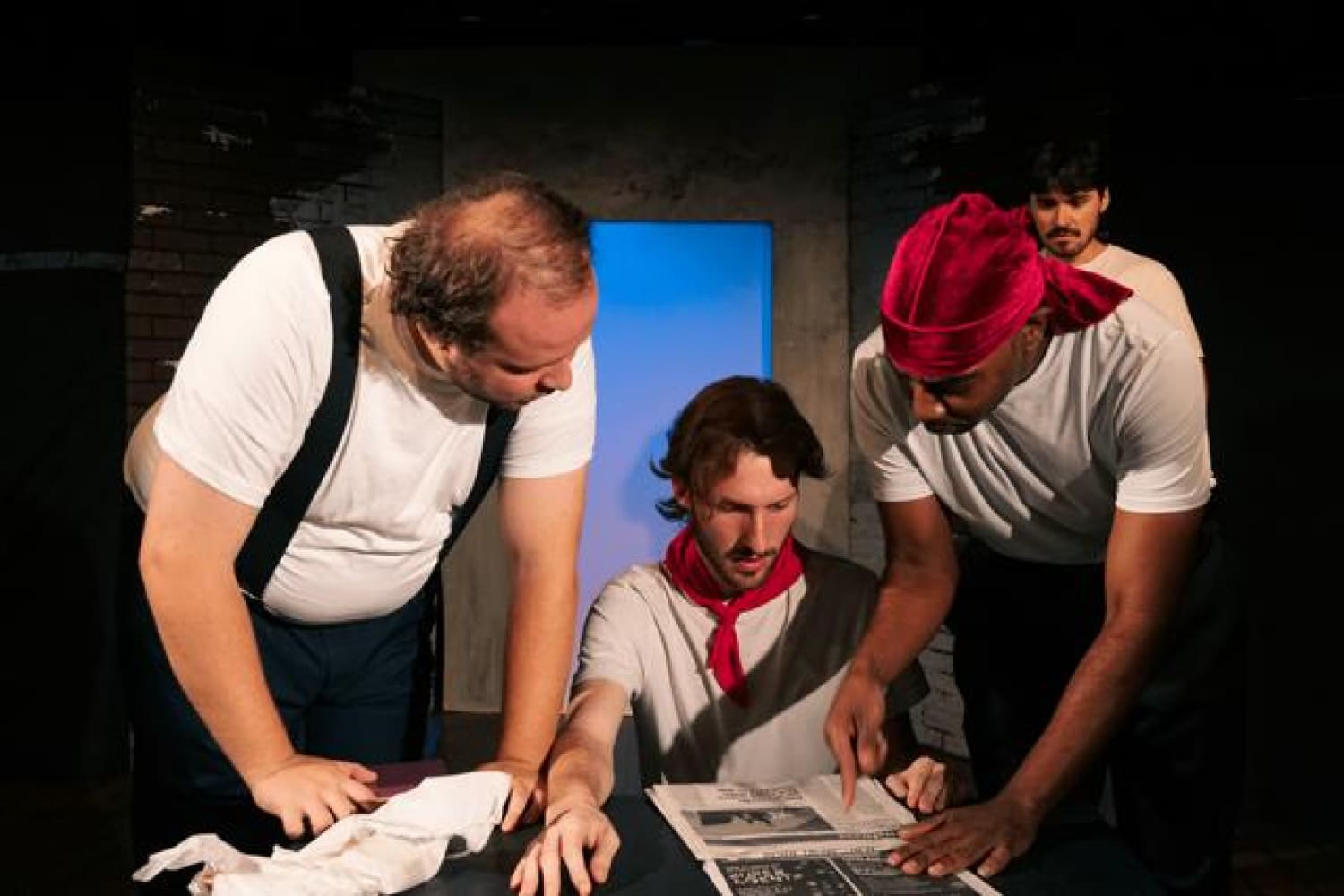
Warren Welds and Samuel Krogh in "Three Scenes in the Life of a Trotskyist" through Aug. 17 performed by LakehouseRanchDotPNG. (Photo by Richard Lewis)
Picture a hotly contested ping pong match. The ball zooms back and forth so fast you can't take your eyes off the action for even a second. Perched on the edge of your seat, you sit ramrod straight and still, wondering which player will miss first.
Experiencing Andy Boyd's intense, brisk, moving, and humorous political play, “Three Scenes in the Life of a Trotskyist” can feel just like that, especially when a skilled cast doesn't simply perform, but becomes the characters. Fortunately, that's exactly what happens in absurdist, experimental, and political theater company Lakehouseranchdotpng's convincing, professional production. It runs for one more weekend at Main Street Players' intimate black box theater in Miami Lakes. The performance lasts about 90 minutes with no intermission.
Until now, Lakehouseranchdotpng has focused mostly on experimental and absurdist work. But recently, under artistic director and co-founder Brandon Urrutia, the small, promising company expanded its mission to include political theater. This shift shows the company's willingness to reflect the zeitgeist by engaging directly with pressing social and political issues.
Under Urrutia's precise direction, the production unfolds at a steady pace and keeps us riveted to the stage. Urrutia and Company have made smart staging and acting choices that suit the characters and their circumstances. The cast comprises Samuel Krogh, Garrett Colon, Pete Rogan, Richard K. Weber, and Warren Welds.
Given everything unfolding politically, 2025 is a fitting time to stage plays that wrestle with social, political, and cultural issues. With terms like “fascism” frequently invoked in discussions of the current administration, producing a play where characters take strong sides and passionately debate feels especially timely.
This political play, which pits followers of revolutionary Leon Trotsky (1879-1940) against Soviet politician and revolutionary Joseph Stalin (1878-1953), includes terminology that may be unfamiliar to some. Unless you are a political intellectual or an adherent of either camp, terms like “Castroism” and “Permanent Revolution” may be new. Fortunately, the company provides a helpful glossary of terms in the program.
The play unfolds in three scenes from the life of Trotskyist Lev. We begin in 1939, when Lev leads a group of followers at City College in New York. There, he spars with Ben, a Stalinist group leader, over the ideological soul of Daniel, a fellow Jewish student from Brooklyn.
In the second scene, we fast-forward to 1967. Lev is now a professor of Modernist literature at Columbia University. Curtis, a Black student, requests an extension on a paper due the next day, warning that if Lev refuses, Curtis will add him to a list of professors targeted for protest. Their argument expands into broader questions of racism, generational shifts, institutional power, and literature.

Pete Rogan and Samuel Krogh in "Three Scenes in the Life of a Trotskyist" through Aug. 17 performed by LakehouseRanchDotPNG. (Photo by Richard Lewis)
The third scene jumps to 1980. Now, four decades after his college years, Lev has become a conservative leader of Ronald Reagan's favorite think tank. He invites his old friend Daniel to his posh Central Park West office. Lev has a motive for this reunion; Daniel has a question: Why has Lev transformed from committed Trotskyist to right-wing activist?
We wonder, too. Did Lev abandon his ideals-or did the world shift, and Lev simply follow?
Frankly, the playwright never clearly dramatizes the motivations or internal process behind Lev's ideological journey. We can infer possibilities-disillusionment? Exhaustion? Seduction by power?
But in a play like "Three Scenes in the Life of a Trotskyist," you rightly expect more character insight. Certainly, Lev's arc would feel more emotionally and dramatically satisfying if Boyd provided clearer answers.
Still, even without them, the play may prompt us to reflect on why people — in public life or private — change stances and shift beliefs.
Normally, we don't expect people to make such an extreme about-face. We also tend to form fixed expectations about certain individuals. For instance, we might picture a young, ardent follower of a political movement as a fierce, defiant activist — someone who shouts thunderously and whose face turns so red with passion that we fear they might explode.
But in Lakehouseranchdotpng's production, Krogh — who has convincingly played icy intensity à la Hannibal Lecter in at least one other role — imbues Lev with believable conviction, never tipping into caricature or cliché. Though he can be loud and passionate, Krogh often smiles easily, lending Lev a charm and bright enthusiasm. It suggests a young man at peace with his ideals-someone energized by his beliefs and eager to share them.
With dark, shining eyes, dark hair, and that bright, inviting smile, Krogh's Lev becomes someone you want to hear out, even if you don't necessarily agree with him or like him.
Krogh maintains that bright passion and affability throughout, giving his portrayal a strong sense of consistency. However, his Lev changes little physically across the production; he doesn't wear aging makeup or a wig to suggest advancing years. We sense little in Krogh's performance to explain Lev's ideological about-face, yet his charisma is so compelling, you can't look away.
This is particularly true during one moment, when the director wisely places him atop a table to highlight him. During that scene, Krogh's Lev shouts, shakes, and sings himself breathless.
During the final scene, as a conservative, Krogh's air of contentment makes sense; he is satisfied with his station in life and is living comfortably. Still, we sense an air of nostalgia as Lev and Daniel (portrayed ably by Pete Rogan) briefly look back on their college years.
In the second scene, as a college professor, Krogh's Lev projects a firm yet sympathetic presence; he's open to student concerns but unwavering in his beliefs.
Krogh is part of a quintet of performers who disappear into their roles. All but Krogh and Weber, as Ben, play multiple parts. Weber matches Krogh's intensity as Ben, the young, staunch Stalinist vying for Daniel's ideological soul. Standing confident and speaking sharply, Weber doesn't back down from his stance.
Garrett Colon plays Daniel with credible tension, standing awkwardly and nervously compared to Krogh's mostly loose Lev. With intense concentration, Colon's Daniel appears to absorb every word from both sides, visibly weighing where his allegiance should lie. In addition to portraying Daniel in the first scene, Colon lends young journalist Sean an eager dutifulness that makes sense.
While Colon deftly plays Daniel in the first scene, Rogan plays him in the final scene, 41 years later in 1980. This time, with a bald head, dark greyish facial hair and dark-rimmed glasses, sincere, convincing concern registers on Rogan's face and we hear it in his voice. Chances are, Daniel has endured much in those four decades — his experiences seem to have aged him as much as time itself.
During the final scene, Boyd briefly touches on the theme of legacy. While the playwright doesn't cover it in depth, Rogan and Krogh touchingly portray it.
Another cast standout is Welds. In the second scene, you sense that his Black character, Curtis, has faced prejudice before and it has worn on him. A look of defeat registers on his face, but you also sense that this is a person who perseveres and won't back down in his argument that he needs an extension on his assignment. With vehemence, yet naturalness, Welds argues his position, standing confidently and speaking sharply. Wisely, at one point, Curtis talks to his professor without facing him. It's a clear sign of disappointment and annoyance. And after speaking to Lev without looking at him, Welds' Curtis casts an accusing glance at the older man.
The actors perform effectively individually and like a well-oiled machine as an ensemble. They remain in the moment throughout and natural, even when they shake with conviction. And they talk about the play's big ideas with impressive naturalness, like it's second nature to them.

Garrett Colon, Richard K. Weber, Warren Welds, and Samuel Krogh in "Three Scenes in the Life of a Trotskyist" through Aug. 17 performed by LakehouseRanchDotPNG. (Photo by Richard Lewis)
The cast performs on scenic designer Tyler Regalado's realistic, minimalist set, which curiously remains essentially unchanged throughout the production. Curving walls painted to resemble bricks line the space, with some of the bricks appearing to be whited out. There are also gaps where doors might normally appear. Just offstage, a dark shelf holds a few books and a legal pad. A lone trashcan completes the scene.
You might find yourself searching for symbolic meaning in this functional yet unspectacular, somewhat abstract set. If a deeper significance exists, it remains elusive.
Leonardo Urbina's lighting is fittingly realistic, and costume designer Erin Proctor's clothing includes period details, such as suspenders. More than one character wears white. Perhaps this reinforces the characters' solidarity with their respective causes-or hints at the idealistic purity they believe they embody.
Sound designer Alex Tarradell's work ensures each spoken word is crisp and clear. His design lets the play's ideas and debates land with clarity and urgency.
In the final analysis, "Three Scenes in the Life of a Trotskyist" can feel dense and somewhat incomplete because it doesn't fully explain what drives Lev's radical change. However, rather than providing clear answers, the play offers a thoughtful meditation on why we hold strong beliefs and how external forces can influence us to shift them. Its deliberate ambiguity encourages us to sit with complexity and engage in meaningful conversation, even without straightforward conclusions.
As for Lakehouseranchdotpng, this young yet bold small professional theater company with a strangely long title continues to produce work that doesn't just entertain — it demands that we think…and perhaps act to bring about change.
IF YOU GO
WHAT: Lakehouseranchdotpng's “Three Scenes in the Life of a Trotskyist” by Andy Boyd
WHEN: Performances are at 8 p.m. Friday and Saturday, 2 p.m. Sunday. Through Aug. 71.
WHERE: Main Street Players, 6812 Main St., Miami Lakes
TICKETS: General admission is $20. Go to https://www.lakehouseranchdotpng.com.


